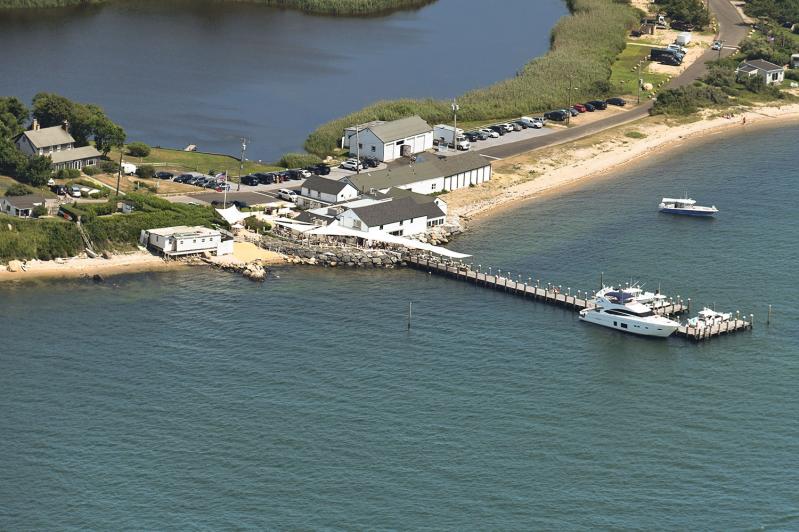Court records in a legal tangle between East Hampton Town and the owner of several Montauk resort and restaurant properties outline a series of secret conversations kept out of public view until now.
Town Councilman Jeff Bragman, who opposed a back-room settlement deal when it came to light in early 2019, denounced the matter in a press conference on Tuesday at his East Hampton law office. Mr. Bragman is the East Hampton Independence Party candidate for town supervisor. He will face the incumbent, Peter Van Scoyoc, in a June 22 Democratic primary.
In 2014, Marc Rowan, a billionaire co-founder of Apollo Global Management who lives in Connecticut, bought Duryea's Dock on Fort Pond Bay. The property and several others nearby had long been the subject of tension among neighbors, town officials, and the Duryea family, notably about a road and what commercial activities were allowed there.
Over the course of about four years, Mr. Rowan became frustrated with what he described as the slow pace of the town's review of changes he sought, alleging that the Planning Department was hiding key documents and that a top staffer, Brian Frank, bore him ill will. And so, in February 2018, he asked for a meeting, according to his deposition in an ensuing lawsuit, with Mr. Van Scoyoc.
Arriving for the meeting at Town Hall with one of his lawyers and a stack of documents, he encountered Councilman David Lys, a 20-year kayaking buddy of his, and invited him to join them. (Mr. Van Scoyoc said in the November 2020 deposition that he had been the one to invite Mr. Lys. Mr. Lys was vague in his own deposition, saying that he had joined them for the meeting's last half-hour or so.)
"I felt that Peter needed to be aware of what was happening in the underlying administrative departments and that at every turn, we, Duryea's, 80 Firestone, Arbor, had tried to do the right thing and the administrative apparatus seemed to be intent on thwarting us," Mr. Rowan testified. The Firestone Road property contained cottages; Arbor was a restaurant Mr. Rowan owned nearby.
Initially, Mr. Van Scoyoc told Mr. Rowan that he still had to go through the regular administrative process. However, by the end of the meeting, the tone had shifted. The supervisor said he would be willing to "consider a global resolution, but it would have to be under judicial supervision," and that there had to be language specifying no cruise ships or ferry service would dock there, a longtime concern of the town's. Mr. Van Scoyoc also outlined several things he wanted in return, including Mr. Rowan deeding Tuthill Pond to the town or to an environmental organization.
In an affidavit in a later legal action, Mr. Rowan recounted that Mr. Van Scoyoc told him he should sue the town, because "politics and public pressure" prevented the town from negotiating a resolution. At the time, Mr. Van Scoyoc called that a mischaracterization and "not true."
Immediately after the meeting broke up, Mr. Rowan's phone buzzed with a text message from Mr. Lys. In his deposition, he said, "I'm not a big texter to begin with. There are a handful of people where I have text messages or who prefer to communicate by text message."
Mr. Lys and Mr. Rowan exchanged messages about what they called the "Duryea's delays." One from Mr. Rowan read, "Trying hard," and was followed by a smiling-face emoji.
Not long after, Mr. Rowan sued the town over its not issuing him a necessary certificate of occupancy; a disputed property line, and a so-called patent that he believed gave Duryea's unique rights to sidestep certain zoning laws. On Tuesday, Mr. Bragman said that the town had not provided a written response to the court, nor even researched the issues involved. Instead and almost immediately, Mr. Rowan's lawyers were deep in secret negotiations with Michael Sendlenski, the top town attorney, on a settlement.
That winter, the town board twice briefly discussed the Duryea's problem in closed session. Then abruptly in early 2019, a court-ordered settlement of the cases arrived in the town board's email inboxes. This was the first time that the members had seen a written agreement, Mr. Bragman said, and worse, he added, it had never taken a vote on a settlement in the first place.
Highly unusual, too, was the fact that Mr. Sendlenski's signature appeared in two places — where Mr. Van Scoyoc's, as a representative of the town, should have been, and on the line reserved for town attorney.
There was another problem. Ann Glennon, head of the town Building Department, was uncomfortable. In her own deposition, she recounted that Mr. Sendlenski had showed her part of the settlement and told her that she was going to have to issue the certificate of occupancy for Duryea's after all, despite the unresolved zoning violations.
A pending building permit application for renovation and reconstruction of an existing garage was to be issued no later than 20 days from the application's completion, according to the settlement, and Mr. Rowan would not be precluded from applying for future alterations on the site. The settlement gave him the right to keep an existing dock, and, most important to his dreams, allowed him to apply to the town planning board to legalize table service, where it was technically disallowed.
Ms. Glennon testified that she asked Mr. Sendlenski if the town board were aware of the settlement order. "And how did he respond?" she was asked at the deposition. "He didn't," she replied.
Odd, too, was the fact that Mr. Sendlenski told her not to email him with reference to the Duryea's settlement. She said this was unusual, and that she was concerned. She took her concern to David Betts, who was above her in the town staff hierarchy. He told her to stick to email.
That same month at a public meeting in Town Hall, Mr. Bragman brought up what he called a one-sided settlement that benefited Mr. Rowan alone. Mr. Sendlenski loudly defended himself.
Mr. Bragman said he opposed not only the settlement but "the almost supine reaction" of the town in crafting it, which he said "completely greenlights a major restaurant."
In the settlement, Mr. Rowan got nearly everything he wanted. The agreement bound the town to legalize all manner of uses and structures on the property and set hard deadlines for the Building Department and planning boards to play along in allowing waitstaff service at the restaurant, where before only a kind of hybrid takeout system had been permitted.
Mr. Van Scoyoc joined Mr. Sendlenski in criticizing Mr. Bragman for not "working hard enough" on the settlement. Taking to his cellphone after the meeting, Mr. Lys sent a text message to Mr. Rowan, describing what had just taken place as a "grandstanding shitshow."
Mr. Sendlenski announced that he was leaving his town job shortly after.
In his own deposition, Mr. Van Scoyoc admitted that he had been angry with Mr. Bragman during the meeting and had made a "misstatement." Other members of the town board, in their own sworn statements, admitted that they, too, had not been involved with the process, much less worked hard on it.
By April 2019, the board had come to realize the extent of the mistake and hired a private law firm to ask a court to invalidate the settlement. The town's outside counsel argued that the stipulation of settlement was invalid and should be vacated because the board did not pass any resolution authorizing it.
After a day of testimony that included court appearances under oath by the entire town board and Ms. Glennon, a judge ordered that the settlement be temporarily put on hold.
Mr. Sendlenski resigned soon after, on May 3, 2019, the day that the Rowan settlement was to have gone into effect.
Mr. Rowan's separate suits against the town, now nine, remain unresolved.




